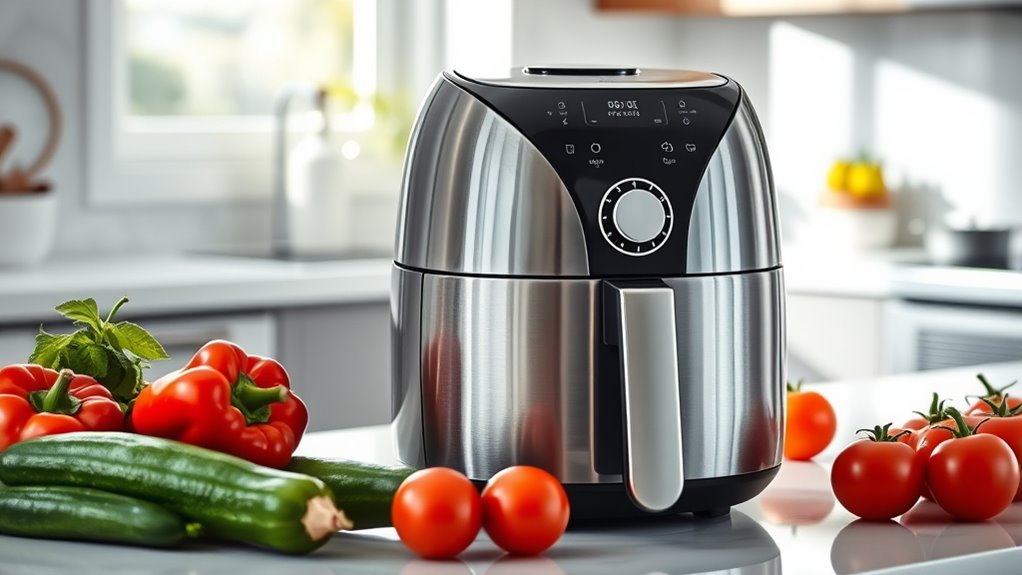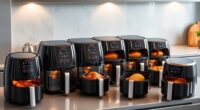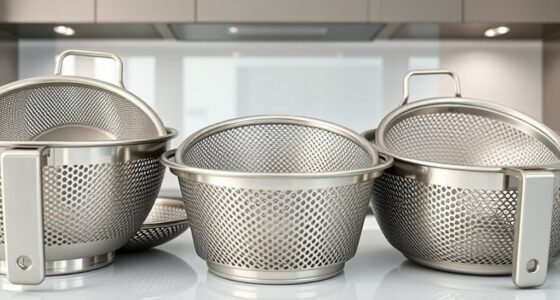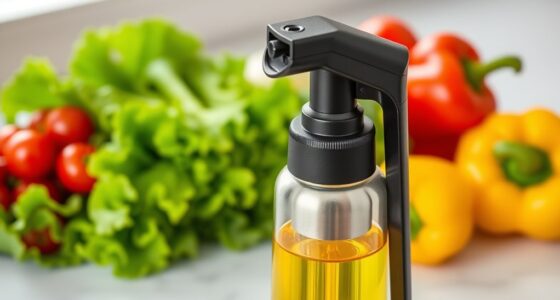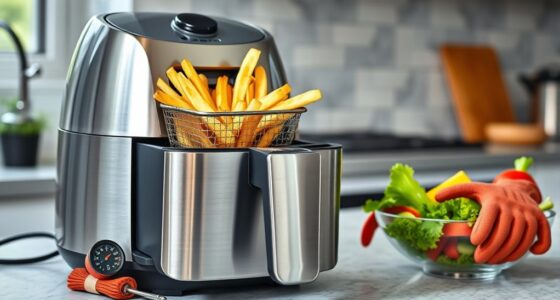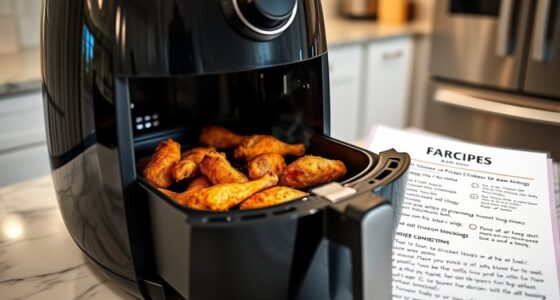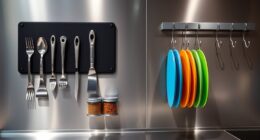To find a non-toxic air fryer, look for models with ceramic coatings free from PTFE and PFOA chemicals, and verify plastics are BPA-free. Check that the manufacturer provides clear details about materials and safety certifications. Opt for well-designed appliances with minimal crevices, easy-to-clean surfaces, and dishwasher-safe parts. Being informed about these features helps you avoid harmful chemical exposure—continue exploring to discover what else makes a truly safe air fryer.
Key Takeaways
- Choose air fryers with ceramic coatings that are free from PTFE, PFOA, and guarantee non-toxic, scratch-resistant surfaces.
- Verify that plastics are BPA-free and clearly labeled as safe for food contact to prevent chemical leaching.
- Look for transparent labeling and safety certifications indicating the use of non-toxic, food-grade materials.
- Prioritize well-designed appliances with minimal crevices and dishwasher-safe parts for easy, chemical-free cleaning.
- Regular maintenance and proper cleaning extend the lifespan of non-toxic coatings and prevent harmful chemical buildup.
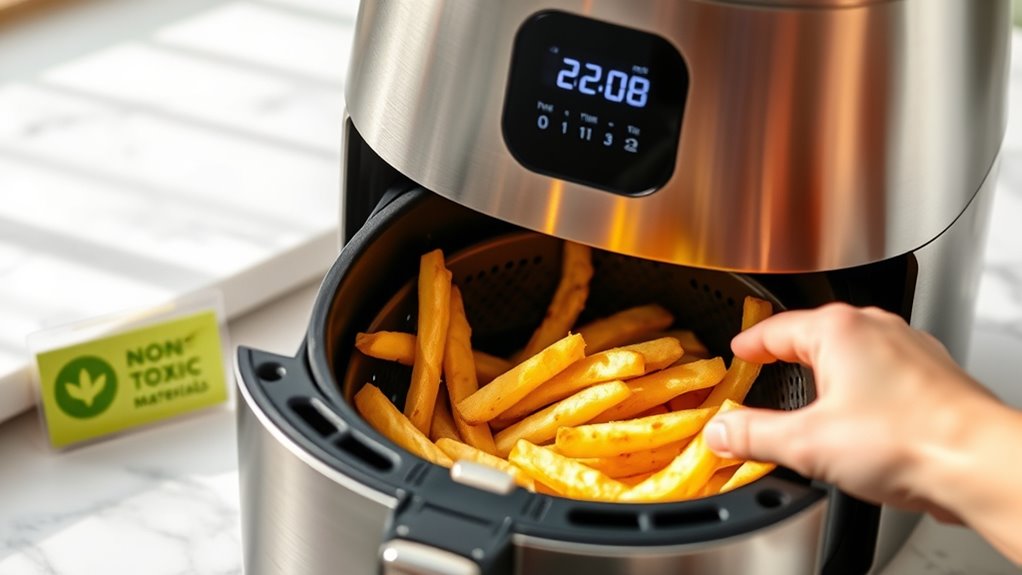
Are you concerned about the safety of your kitchen appliances? If so, you’re not alone. Many people worry about the materials used in air fryers, especially since they come into contact with food at high temperatures. To ensure you’re making a healthy choice, it’s essential to know what to look for in a non-toxic air fryer. One of the key features to consider is the type of coating used inside the basket or pan. Ceramic coating is a popular option because it’s free from harmful chemicals like PTFE and PFOA, making it a safer, non-stick alternative. Its smooth surface resists scratches and doesn’t emit toxic fumes when heated, giving you peace of mind during cooking. Additionally, check if the air fryer’s plastic components are BPA free. Bisphenol A (BPA) is a chemical found in some plastics that can leach into food and disrupt hormonal functions. Manufacturers who use BPA-free plastics demonstrate a commitment to health-conscious design, reducing the risk of chemical exposure. These plastics are sturdy and heat-resistant, ensuring the parts don’t degrade or release toxins over time. When shopping for a non-toxic air fryer, verify that the manufacturer explicitly states the use of BPA free plastics and ceramic coatings. This transparency indicates they prioritize consumer safety and quality. Beyond materials, consider the overall construction of the appliance. A well-designed air fryer will have minimal crevices and easy-to-clean surfaces, preventing buildup of food particles and bacteria. Look for models with dishwasher-safe components, as this helps maintain hygiene without the need for harsh chemicals. It’s also worth noting that some brands emphasize the use of eco-friendly manufacturing processes, which can reduce your environmental footprint and eliminate concerns about harmful residues. When reading product descriptions or labels, be cautious of vague claims. Reputable brands provide detailed information about the materials used, ensuring you’re getting a genuinely non-toxic product. Keep in mind that a non-toxic air fryer isn’t just about the materials; it’s also about how you use and maintain it. Regular cleaning with mild detergents and avoiding abrasive scrubbers will prolong the lifespan of your ceramic coating and plastics, keeping your appliance safe for years. It’s helpful to educate yourself about non‑Toxic materials and their safety standards to make more informed choices. Ultimately, choosing a non-toxic air fryer involves a combination of understanding the materials, verifying safety certifications, and maintaining your device properly. By paying attention to details like ceramic coatings and BPA free plastics, you’re taking important steps toward healthier cooking and a safer kitchen environment. Your health and peace of mind depend on making informed choices, so always do a little research before bringing a new appliance into your home.
Frequently Asked Questions
Are Non-Toxic Air Fryers More Expensive Than Traditional Models?
You might find that non-toxic air fryers are a bit pricier than traditional models. The price comparison often reflects higher-quality, safer materials and better warranty coverage. Investing in a non-toxic option means you’re paying for enhanced safety features and durability. While the initial cost may be higher, the long-term benefits of healthier cooking and fewer replacement concerns can make it a worthwhile choice.
How Long Do Non-Toxic Air Fryers Typically Last?
Durability, lifespan, and replacement factors shape your air fryer’s longevity. Typically, non-toxic air fryers last around 5 to 8 years if you care for them properly. Regular use, diligent cleaning, and quality construction boost their lifespan. Cheaper models may need replacing sooner, while sturdy, well-made units can endure longer. So, choosing a durable design can dramatically determine how many delicious meals your non-toxic air fryer will serve over the years.
Can Non-Toxic Air Fryers Be Used for Baking?
Yes, non-toxic air fryers offer great baking versatility. You can use them to bake cakes, cookies, and even bread, thanks to their even heat distribution. Their non-stick surfaces make it easy to remove baked goods without sticking or breaking apart. Just make sure to check the temperature range and accessories included. Overall, they’re a convenient, safe choice for a variety of baking needs in your kitchen.
Do Non-Toxic Air Fryers Require Special Cleaning?
You’ll find that non-toxic air fryers generally don’t require special cleaning, but proper cleaning maintenance is key. Use gentle soap and water to clean surface materials like ceramic or stainless steel, avoiding harsh abrasives that could damage them. Regular cleaning after each use helps prevent build-up and keeps your appliance in top shape. Always check your user manual for specific cleaning instructions to guarantee longevity and safe operation.
Are Non-Toxic Air Fryers Suitable for Large Families?
If you’re considering non-toxic air fryers for large families, you’ll find they’re quite suitable for family meal prep. Their cooking capacity varies, so choose one with enough space to handle bigger batches efficiently. This helps you save time and effort during busy weeknights. Just make sure to select a model that matches your family’s needs, ensuring you get the right size for your meal prep and daily cooking routines.
Conclusion
So, next time you’re dazzled by shiny, “non-toxic” air fryers, remember: all that glitters isn’t gold—or safe. Do your homework, read those labels, and skip the marketing hype. After all, who needs a kitchen gadget that’s more toxic than a chemistry lab? Stay vigilant, stay savvy, and enjoy your crispy snacks without turning your home into a chemical playground. Because, really, your lungs deserve better than a plastic fiesta.
